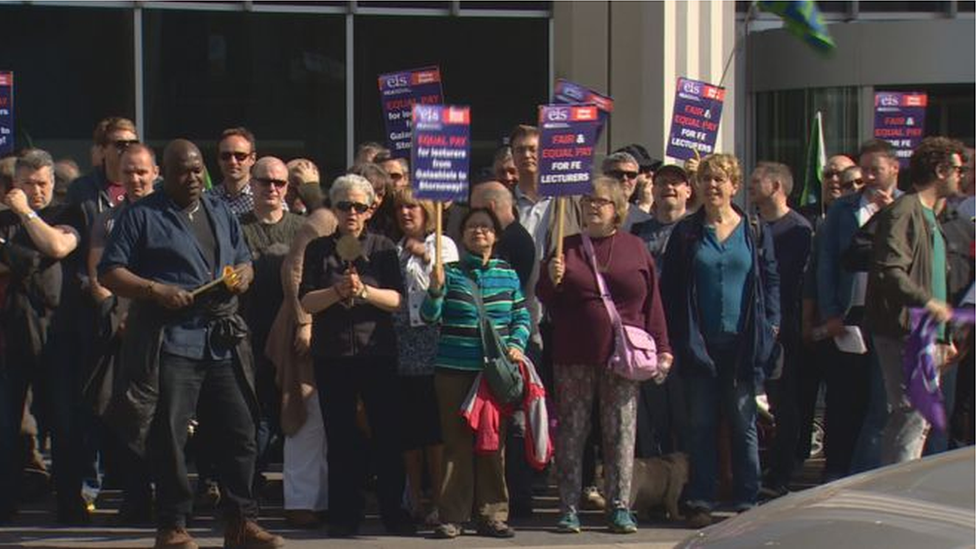College disruption as lecturers strike over pay
- Published

It is the third time in four years that college lecturers have gone on strike
Colleges across Scotland are facing serious disruption due to a 24-hour strike by lecturers over pay.
The EIS Further Education Lecturers' Association is calling for a "fair" cost-of-living pay rise.
Colleges argue their offer is generous and many lecturers have seen "huge" rises in recent years. The union has three more strike days scheduled.
It is the third time in four years that colleges across the country have been hit by industrial action.
Details of the disruption to students will vary from college to college. The likelihood is that many classes will be cancelled but college buildings and facilities such as libraries are likely to be open.
Colleges are offering a 2.5% cost-of-living rise - it would be the first such rise for three years.
The details of the pay dispute are complex.
Salaries 'unchanged'
Many lecturers have had substantial pay rises in recent years because of an agreement to equalise rates of pay at different colleges. Many would also get such payments this year.
However, some other lecturers - especially those who worked at the colleges which previously had the highest rates of pay - have seen their basic salaries remain unchanged for three years.
The EIS FELA believes the cost-of-living pay rise for all lecturers and rises to help standardise salaries should be treated as distinct issues.
The union says it has been seeking a meeting with employers - but claims they were not prepared to have one ahead of today's strike.
In a letter sent to Colleges Scotland earlier this week, EIS general secretary Larry Flanagan said: "I understand that FELA negotiators have moderated our original cost-of-living claim which now matches the deal agreed with support staff unions and should provide the basis for agreement to be reached.
"That cannot happen, however, unless management is at least prepared to come to the table. Why wouldn't you?"

Students across the country will be affected
An agreement on equal pay was agreed in May 2017 after a series of strikes. It included agreed increments for lecturers in those colleges which paid lower salaries to help standardise pay across the country.
Until a few years ago, individual colleges had their own terms and conditions of employment and there were major disparities between the earnings of staff doing similar jobs at different colleges.
New national pay scales and some terms and conditions have been agreed but the union is still seeking agreement on a full set of national conditions of employment for lecturers.
Colleges Scotland argues that once this year's stage of the harmonisation agreement is included, the average pay rise for lecturers would be 12.2% or more than £4,000.
Shona Struthers, the chief executive of Colleges Scotland, said: "It is extremely disappointing that the EIS-FELA is taking disruptive strike action for the third time in four years.
"This offer on the table is the best overall pay rise for public sector workers anywhere in the UK, but the EIS-FELA want even more.
"At the heart of this dispute is the EIS-FELA's refusal to recognise the substantial pay increases awarded to most lecturers from the previously agreed 'same pay' deal represent a pay rise.
"They also want more pay for cost-of-living, but a pay rise is a pay rise, irrespective of whether it comes from the 'same pay' agreement or the additional cost of living offer."
Annual holidays
Ms Struthers also pointed to lecturers having benefitted from receiving a minimum of 62 days' annual holiday, a reduction in weekly contact with students to 23 hours, as well as "excellent career average pensions".
She said: "Lecturers in Scotland are already the best paid across the UK and this offer brings the average salary up from £36,125 in April 2016 to £40,522 in April 2019.
"The EIS-FELA is demanding lecturers' pay increases by 16.2%, which would cost colleges an additional £31.5m on top of the £23.4m 'same pay' deal costs. This is unaffordable and unsustainable for the sector."
The Scottish government says it wants the dispute resolved.
Further Education Minister Richard Lochhead said: "The Scottish government has invested heavily in Scotland's colleges and is funding in full the additional costs of this harmonisation, which is helping colleges deliver an average 9% pay increase to lecturers over three years.
"I continue to urge both sides to resolve this dispute in a spirit of collaboration and co-operation as its continuation is in no-one's interests, least of all our students."